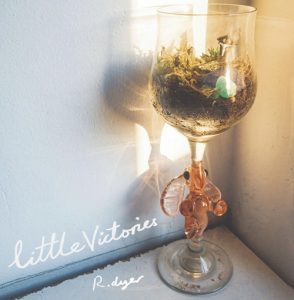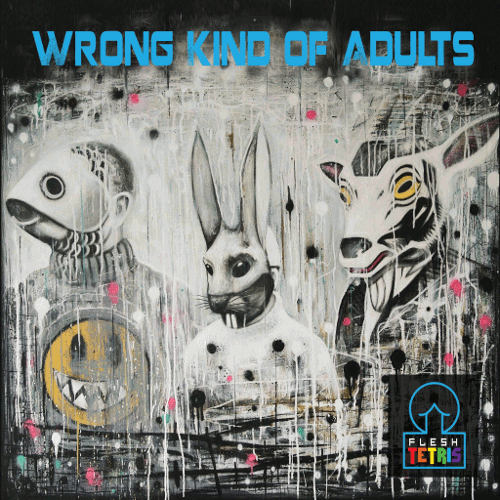 Little Victories begins with melancholic woodwind and recordings of the last two answerphone messages from R.Dyer‘s brother, who died from cancer. The messages are brief, fond, and carry no hint of tragedy: “Take care, bye!”
Little Victories begins with melancholic woodwind and recordings of the last two answerphone messages from R.Dyer‘s brother, who died from cancer. The messages are brief, fond, and carry no hint of tragedy: “Take care, bye!”
Although you could locate R.Dyer’s musical world in the eerie folktronica of their contemporaries, I’m most reminded of Pram, post-rock’s contrary Brummie blatter-fiends. The kitchen-sink orchestrations, the macro-micro focus, the sense of a universe both galactic and mundane, not to mention the theremins, clarinets, microtonal slippage, and musical saws. Little Victories isn’t anywhere near as frenetic as Pram could get, but here are similar skirls of notes which sometimes are only barely holding it together as a tune — the musical embodiment of spinning atoms only barely holding it together as human beings.
R.Dyer deploys an array of noise makers on the album: synths, sax, home-made waterphone, harps (both space and regular, apparently), percussion, glockenspiel, as well as voice notes and field recordings. What you’re missing with the recorded versions of Little Victories is the in-person thrill of R.Dyer’s live show, which sees them picking up one instrument after another, setting up loops, a pedal here, a saxophone there, tending to noises in turn like an attentive gardener nurturing seedlings.On record, it’s a collective endeavour, with contributors and collaborators from R.Dyer’s hometown of Brighton and beyond. Vocals come from Maria Marzioli (Slum Of Legs / YOU&TH), Kev Nickells (Hákarl), Jane Bom-Bane, Tamsin Chapman (Slum Of Legs), Martyn Lewis (M.Butterfly), Daisy Jordan, Melanie Pegge, Jon Griffin (Sairie), Michelle Steele (Slum Of Legs/ October Club), Iain Paxon (Hamilton Yarns) and Adam Kane (Sad Funeral), with drums from Ed Briggs.
The fact that Little Victories owes its existence to a community is telling; it presents humans as little creatures clinging onto existence in fragile worlds, like the miniature figures in a terrarium on its cover, atomised beings that need tenderness and connection to stay put.Throughout the album we hear voices relating minor triumphs — the joy of comfortable new pants when you’re used to rubbish undies; an astonishment of starlings at dawn after a sleepless night of pain; someone taking pride in learning the names of the mermaid purses they’d found on a beach; someone else marvelling at fried eggs — poignant confessions which would change your mind about humanity if all you’d known of homo sapiens were ecocide, corruption and bloodshed.
These accounts (gathered over the course of several years) are woven through a background of grief like gold thread. In “Little Victories” (“Today, I just lay in bed and thought about you precisely five thousand and sixty-two times … Today was a brick wall.”) it becomes clear that R.Dyer is convincing us, as well as themselves, that beauty is what gets us through, by actively making art to that end. A strategy that very effectively counters any accusation of the victories in question being either banal or platitudinous. “Today I felt happy to be alive for 48 seconds … that’s a personal record.”
The concept of “recording” as in “record taking” is central to the album. Little Victories is a work which acknowledges and preserves experiences, not just answerphone messages from the irrevocably lost, or those recounting their pants-based triumphs, but imaginings of other voices whose stories deserve to be heard. It’s a dossier compiling the case for the defence, an polytonal, poly-perspectival argument in favour — sometimes surprisingly — of life.The central track (thematically and literally) “Canary (Down In The Mines)” is narrated by a pit canary. It describes a caged existence in service to miners, the little bird being knocked out by deadly gas and revived over and over: “pull me back to the earth boys, again and again …” You might be reminded of Sylvia Plath’s “Lady Lazarus”, unwillingly brought back to life, especially in context of Plath’s own gas-induced death. Of the service of women in general. Of sacrificial lambs and saviours. Or of how Wilfred Owen (“Gas! GAS! Quick boys!”) gave the lie to the grotesque notion of the nobility of death in servitude.
But the track also sets out a clear, compassionate comparison between the canary’s pitiful life and that of the working class, with the canary finding common ground with the miners whose gentle attentions bring it round to sing again, whether it likes it or not. Nothing so simple as goodies and baddies here: “When your life is proscribed by the cages of men, you learn how to see others trapped inside them”.
The long shadow of lockdown is felt on Little Victories: those days of solitude, stillness, clarity and sunshine, the distillation of life’s joys that so many of us experienced alongside the horror and boredom. We get a little child being repeatedly asked “What makes you happy?” The answer is indistinct, but there are giggles. Snatches of longer stories involving lost friends. Melodies like nursery rhymes — “ripples bright and beautiful” — play over and against minor chord drones, lyrics and cadence admitting the pull of darkness and how painful it is to know that moments of sunlight and happiness are fleeting.The last track, “King Alfred’s Cakes”, takes an even more fanciful perspective than that of the canary: a wooden desk made in 1895 talks about its long existence, the voices it has heard, the tree from which it was made, the mass-produced Billy bookcase it faces across the room, and the unfinished tax return in its drawer… The desk’s musings take it spiralling from its life as a sapling to its possible futures, beyond the era of men, when it’ll be food for fungus — the King Alfred Cakes of the title.
Named for a king’s all-too-human mistake, the black bun-like fungus carries a fair weight of symbolism here — not just recalling coal, but, as it grows on ash (currently going through a catastrophic global die-back) also the rotting / evolving natural world we’re all destined to be consumed by. Whether that’s a comfort or not is up to you.Like the singing canary destined to die over and over for the sake of saving other people’s lives, you get the feeling that being tethered to earth is a mixed blessing for someone who is bound (both for themselves and the wider world) to dig up and record the nuggets that make life worth living. But isn’t that the labour of art — to find the light and make a case for life? It’s certainly what makes Little Victories such an extraordinarily humane and nuanced piece, an implausible lifeboat fashioned from flashes of brightness and beauty, full of fondness for human beings at their gently eccentric best.
I say fondness; I mean love. This album is full of it.-Lucy Cage-



